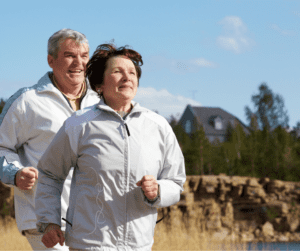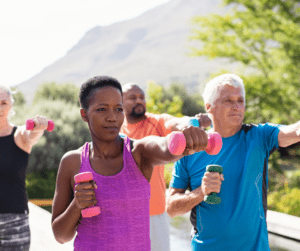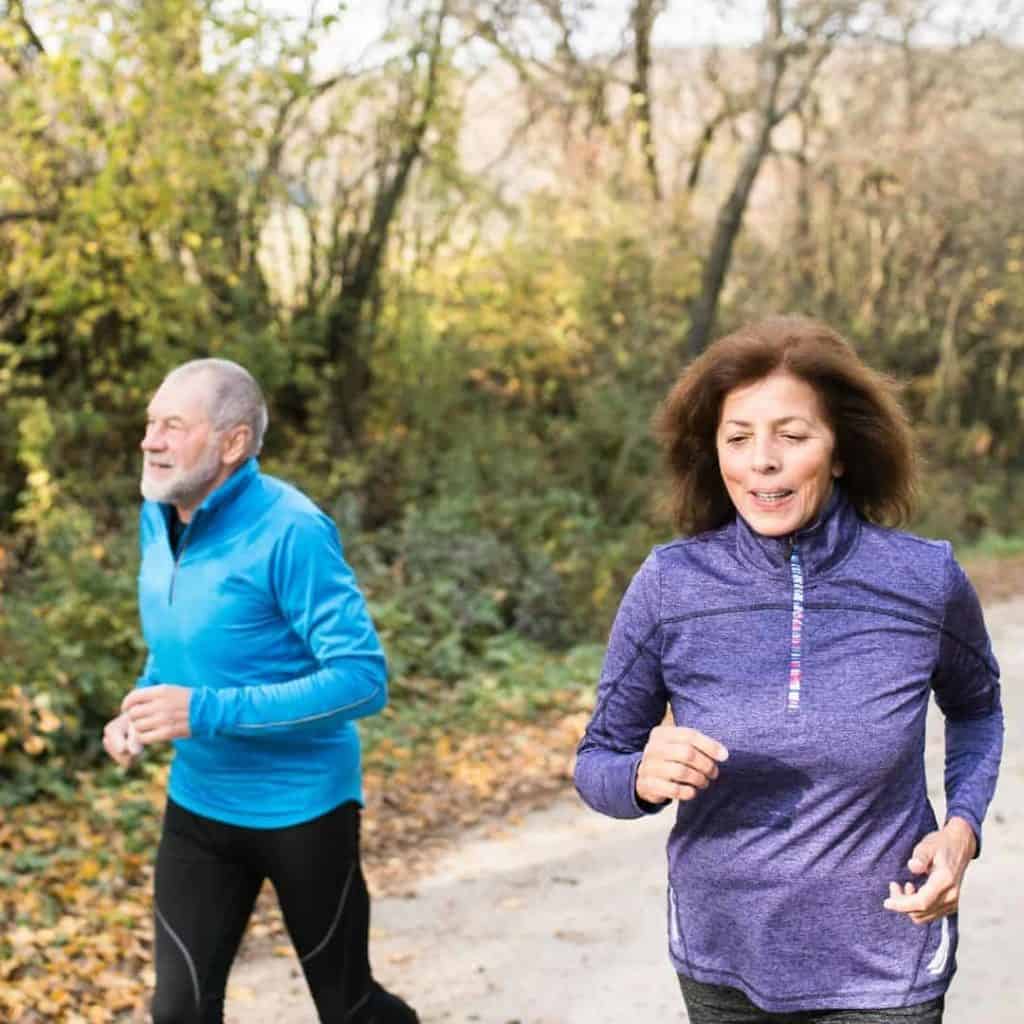You’re 50+ and want to start one of the most beloved hobbies across the globe – fantastic!
Most people believe that after 50 you are sort of hitting the downhill slope of the rest of your life… but I know you believe that age is just a number.
Age is no barrier. It’s a limitation you put on your mind.”
Jackie Joyner-Kersee (Retired American track and field athlete, ranked among the all-time greatest athletes in the heptathlon as well as long jump.)
Studies suggest that running over 50 years old, whether you are experienced or not, is a great way to improve cardiovascular fitness. Middle-aged, beginner runners will gain the same benefits as experienced, middle-aged runners. These include healthier muscle mass, a stronger heart, and less body fat.
As you age there are some unique challenges associated with maintaining your health and wellness whilst you immerse yourself in the running world. This may leave you wondering if it’s all really worth it…

Is Running After 50 Worth It?
A study between 1980 and 2009 was conducted, analyzing participants in the New York Marathon. The results were very interesting, the percent of middle-aged runners finishing the marathon increased significantly, while the number of people under the age of 40 who finished, decreased.
Staying active as you age is critical to keeping healthy and happy, running is an excellent form of exercise, that can be started at any age, whether it’s at age 6 or age 60.
5 Reasons Why It’s Never Too Late To Start Running
- Health benefits.
- The social side.
- It’s okay to start slow.
- Increased life expectancy.
- Minimal equipment is needed.
Health Benefits
According to the Journal of American College Of Cardiology: Running can decrease your risk of death from cardiovascular disease by 45%.
This is due to HDL (high-density lipoprotein) cholesterol “good cholesterol” and improved blood pressure. Running gives you a better quality sleep which is essential for your health, it also improves your memory, boosts your mood and concentration levels.
“A runner’s high describes a sense of well-being during endurance exercise characterized by euphoria and anxiolysis.”
This sense of well-being reduces anxiety and contributes positively to one’s mental health.
Social Benefits

As a newbie runner, it’s helpful to know that studies have proven that when we run with others, we run faster and farther more easily than we would if we were running alone.
Social running like joining clubs or starting a program with friends will add an instant boost of motivation and inspire you to try new events, share stories, learn from each other, and build confidence.
Starting Slow Is The Way To Go
It’s never too late to start running after 50, we believe no matter your age, as a new runner, the way to go is definitely slow. There is absolutely no rush when it comes to running – hard to believe right!
It’s important to remember that taking things slow and building up your running fitness incrementally will ensure that you are building up your strength and that you are minimizing your risk of getting hurt.
Increased Life Expectancy
Recent studies show that even running just once a week or a couple of times a month can have a major effect on your life expectancy compared to people who don’t run at all.
14 individual studies were conducted by the British Journal Of Sports Medicine. The studies were based on the association of running and the risk of death from all causes, heart disease, and cancer.
The pooled sample included more than 230,000 participants (10% were runners).
The study tracked the participants for between 5.5 & 35 years.
The results:
25,951 participants died, when the data was analyzed it was noted that runners had a 27% lower risk of dying during the study compared to non-runners.
Running was associated with a 30% lower risk of heart disease and a 23% lower risk of death from cancer.
Minimal Equipment Needed
One of the fantastic things about getting into running is that it’s accessible to absolutely anyone, no matter your budget. You don’t need any equipment or memberships.
All you need is a good pair of running shoes.

We know that an active lifestyle keeps your muscles and bones strong, your mind sharp, and can add years to your life, but how do we actually start running?
5 Tips To Start Running After 50 (And Enjoy It!)
1. Walk before you run
This doesn’t mean that you mustn’t run at all, it means that you should do more walking than running. Walking builds up the muscles, ligaments, and tendons that you need for running. The gradual change from walking to running is what’s going to allow you to reap the benefits.
2. Strength Training
Strength training is and becomes more important as you age. From as early as your 30’s you will experience a steady decline in muscle mass. Strength training reduces this loss and allows your body to cope with this new exercise regime, it will also help contribute to you becoming a better runner as well as protecting your body from injury.
Here at Coach Parry we a massive advocates of strength training, especially as we get older. That is why we’ve created this free masters strength training plan for you to download.
3. Build up slowly
Build up in blocks (ie. be sure to take a recovery week every 3-4 weeks) this doesn’t mean you do nothing, you can still run 3-4 times per week but you reduce the volume in the 3/4 week to aid recovery and give you all the benefit of the training you have just done
4. It’s important to not run more than four days a week
As a general rule, beginner runners that are 50+ should stick to running 3 to 4 days a week maximum. This will allow the body to recover correctly and prevent injury.
5. Cross-training is your friend
You need to start slowly, cross-training will allow you to push yourself a bit harder with non-impact cardiovascular exercises. These exercises don’t contribute to the load that you would be placing on your joints when you start running in your 50’s.
Wouldn’t it be amazing if there was some sort of “special key” to mobility, flexibility, lower injury risk, improved performance, and counteracted aging? Well, there is… it’s called strength and conditioning.

Strength Training After 50
Strength and conditioning training becomes so important as we age, as much as we all hate to admit it, the effects of aging are very real and research shows that by the ages of between 60 and 70, you can lose up to 30% of your muscle mass and strength training will help combat just that. Running is hard on the body so you do have to ensure that you’ve got the strength to sustain that load.
Give the Coach Parry masters strength training program that is written specifically for runners over the age of 50 a try,
You can download our free master’s strength training plan by clicking here.
You now know why you should be running, you know how to prepare for your running, you know how to run, but how fast should you be running?
How Fast Should A 50-Year-Old Beginner Be Running?
When starting, you should go for sessions between 15 to 20 minutes at a time and walk for four to five minutes, followed by a one-minute run. This should be repeated for the entire 15 to 20 minutes.
Every one to two weeks, depending on how easy the above method is and how well your body takes to it, you will then reduce the walking, increase the running and slowly increase the session time.
In eight to twelve weeks you will be able to run five kilometres without needing to walk at all.
Once you’re a bit more experienced, you may be interested in improving your (PR) personal record. Here’s how you can continue running fast into your fifties and beyond:
Common Stumbling Blocks For New Runners In Their 50’s
- Potential injuries. Some include shin splints, runner’s knee, and achilles tendinitis.
- A decline in cardiovascular endurance. This is why it’s important to take things slow.
- Shrinking muscles. (Sarcopenia) This happens normally as people age, strength training will help combat this.
To conquer these stumbling blocks and arrive at your next run feeling great we have one very important word for you…
Recovery
Recovery is one of the most important, yet very often ignored aspects of running.
You only benefit from the training you recover from. Adaptation to exercise only happens in recovery not actually while we do it.
If you want to recover from training sessions quicker, not feel fatigued all the time, run pain & injury free and improve your endurance so that you can run faster well beyond your fifties, then the Faster Beyond 50 Free Masterclass is specifically for you.
Save your seat by clicking here.

Join us for a free online presentation of the…
The Faster Beyond 50 Masterclass
…and discover how you can run well (and faster) as you get older, without training more or harder than you currently are, all while avoiding injury.
If it feels like you’re training harder than ever but not running the paces you’d like to be running or if you’re constantly tired, fatigued or running in some sort of pain, then this is specifically for you.




Comments are closed.